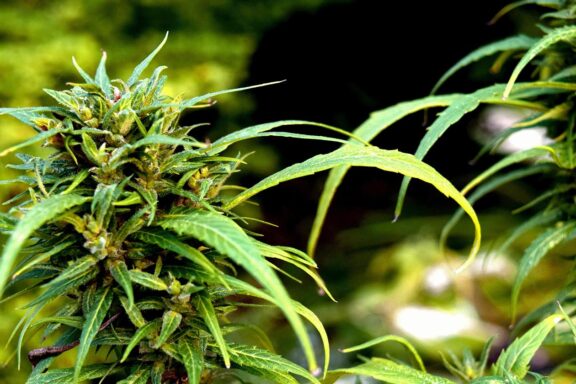Cannabis is a plant with many uses and effects, both medicinal and recreational. Its effects depend on the active compounds it contains and the way in which it is consumed.
Cannabis definition
Cannabis is a plant belonging to the genus Cannabis, which comprises three main species: Cannabis sativa, Cannabis indica and Cannabis ruderalis. Parts of the plant are used for a variety of purposes, both medicinal and recreational.

Here are a few key points about cannabis
Active Compounds
Cannabis contains over 100 chemical compounds called cannabinoids. The two best known are THC (delta-9-tetrahydrocannabinol) and CBD (cannabidiol). THC is psychoactive, which means it can alter the mind and produce euphoric effects, while CBD is not psychoactive and is often used for its therapeutic properties.
Medicinal uses
Le cannabis is used to relieve a variety of symptoms, including chronic pain, chemotherapy-induced nausea and vomiting, and certain symptoms of multiple sclerosis. Cannabis-derived products, such as CBD oil, are also used to treat certain forms of epilepsy that are resistant to other treatments.
Recreational uses
Some people use cannabis recreationally for its relaxing and euphoric effects. It can be consumed in a variety of ways, including smoking, vaping, edibles (such as brownies or sweets), or topical creams.
Legal status
The legality of cannabis varies from country to country and even from region to region within the same country. In some places it is completely legal for medical and recreational purposes, while in others it may be banned altogether or authorised only for specific medicinal uses.
Health effects
The use of cannabis can have a variety of effects on health. In the short term, it can lead to feelings of relaxation and euphoria, altered sensory perception and increased appetite. In the long term, excessive use can lead to memory problems, mental health problems and dependence.
In short, cannabis is a plant with many uses and effects, both medicinal and recreational. Its effects depend on the active compounds it contains and the way in which it is consumed.
Read our article: What is HHCP0?
Medical uses
Cannabis has a number of medical applications, thanks to its active compounds, mainly THC (delta-9-tetrahydrocannabinol) and CBD (cannabidiol). Here are some of the main medical uses of cannabis:
Pain management
Cannabis is often used to relieve chronic pain, particularly when other treatments are not effective. It is commonly prescribed for pain associated with conditions such as arthritis, neuropathic pain and post-operative pain.
Reduced nausea and vomiting
Patients undergoing chemotherapy for cancer can experience severe nausea and vomiting. Cannabis, particularly in the form of THC, can help to alleviate these symptoms and improve patient comfort.
Muscle spasticity and symptoms of multiple sclerosis (MS)
Cannabis can help reduce muscle spasticity and relieve the symptoms of SEPsuch as painful muscle spasms and rigidity.
Sleep disorders
Some studies suggest that cannabis can help improve sleep quality, particularly in people suffering from sleep disorders linked to conditions such as sleep apnoea, fibromyalgia, chronic pain and MS.
Epilepsy and seizure disorders
CBD, particularly in the form of medicines such as Epidiolex, has been shown to be effective in the treatment of certain rare and severe forms of epilepsy, such as Dravet syndrome and Lennox-Gastaut syndrome.
Anxiety and mental disorders
Some people use CBD to help manage anxiety, although the evidence is still being assessed. The CBD is also being studied for its potential effects on other mental disorders such as depression and post-traumatic stress disorder (PTSD).
Appetite and weight loss
THC is known to stimulate the appetite, which can be beneficial for patients with conditions leading to significant weight loss and reduced appetite, such as HIV/AIDS or certain cancers.
Treatment of certain gastrointestinal diseases
Cannabis can also be used to treat inflammatory bowel diseases such as Crohn's disease and ulcerative colitis, thanks to its anti-inflammatory properties.
Neurodegenerative diseases
There is ongoing research into the neuroprotective effects of cannabis and its compounds for diseases such as Parkinson's, Alzheimer's and amyotrophic lateral sclerosis (ALS).
These medical applications show that cannabis and its derivatives can offer viable treatment options for a variety of health conditions. However, it is essential that the medical use of cannabis is supervised by a healthcare professional to ensure its effectiveness and safety.

Recreational applications
Cannabis is used for its relaxing and euphoric effects. It can be consumed in a variety of ways, including smoking, vaping, edibles (such as brownies or sweets) or topical creams.
Universal types of cannabis
Cannabis, with its various active compounds, offers a range of effects and practical applications that depend on the varieties used and the specific needs of individuals.
Cannabis Sativa
Characteristics: Cannabis sativa plants are generally tall with long, thin leaves. They grow best in warm, sunny climates.
Effects: Sativa is known for its energising and stimulating effects. It is often used during the day to improve mood, concentration and creativity. It can also be useful for treating depression, fatigue and certain mood disorders.
Cannabis Indica
Characteristics: Indica cannabis plants are shorter and bushier, with broad leaves. They are better suited to cold climates and indoor growing environments.
Effects: Indica is known for its relaxing and sedative effects. It is often used in the evening to promote sleep and relaxation. It can be useful for treating insomnia, chronic pain, muscle spasms and anxiety.
Cannabis Ruderalis
Characteristics: Cannabis ruderalis is a small, robust plant that originated in colder regions. It is less common and generally contains less THC than the sativa and indica varieties.
Effects: Ruderalis is less psychoactive but is often crossed with other varieties to create auto-flowering hybrids that flower independently of daylight.
Hybrids
Characteristics: Hybrids are crosses between sativa, indica and sometimes ruderalis varieties. They can be either indica-dominant, sativa-dominant or balanced.
Effects: The effects of hybrids depend on the specific characteristics of the parent varieties. They may offer a blend of the energising effects of sativa and the relaxing effects of indica. Hybrids are often grown to maximise certain medicinal or recreational effects.
Varieties rich in CBD
Characteristics: These varieties are specifically cultivated to contain high levels of cannabidiol (CBD) and low levels of THC.
Effects: They do not produce strong psychoactive effects and are used mainly for their therapeutic properties, such as reducing inflammation, managing pain and treating anxiety and epilepsy.
Cannabis is produced in three main forms
Cannabis herb (also known as marijuana) - the flowering tops and dried leaves of the cannabis plant.
Cannabis resin (also known as hashish) - the resin of the cannabis plant.
Cannabis oil (also known as hash oil) - a thick oil obtained from hashish.
Although hashish and hashish oil contain more than THC than marijuanaHowever, they are not widely used in Switzerland. Cannabis is generally smoked and often mixed with tobacco. It is also sometimes added to food and consumed.
Where can I buy cannabis?
MariSwiss is a Swiss company dedicated to offering legal cannabis products. Our products can include:
-
CBD flowers
-
CBD resins
-
HHCPO flowers
-
HHCPO resins
-
THCP flowers
-
THCP resins
At Mari SwissYou can buy and have it delivered to your door quickly and discreetly.
